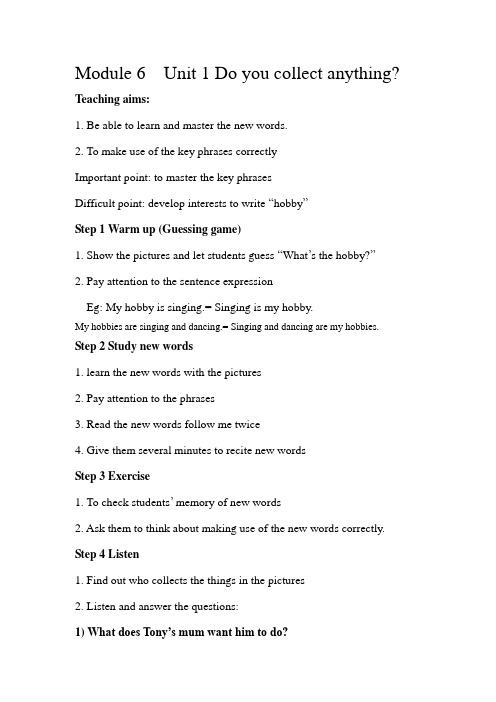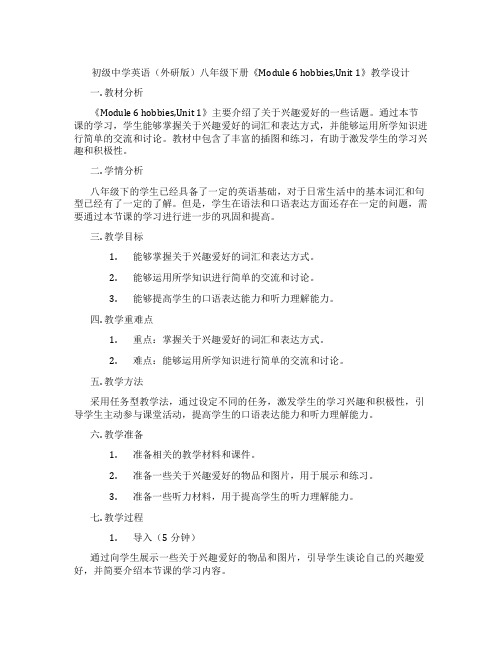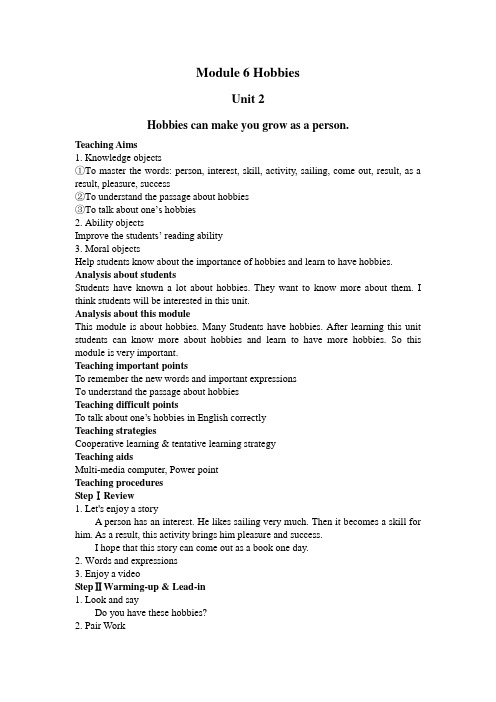2014年八年级英语下册Module 6 Hobbies教案(外研版)
(完整word版)【外研版初二英语】八年级下册Module6Hobbies复习教案

Module 6 Hobbies一、课程介绍知识点1. 重点词汇用法:cost,spend,pay,take的用法2. 重点词组用法:be interested in / as well as /be pleased with 的用法3. 重点语法: 简单句基本句型教学重点1. 各重点词汇及短语用法2. 重点词汇短语的用法教学难点Please pleased pleasure pleasant的区别二、要点回顾Ⅰ.词汇短语1.prep. 作为,当2.n.邮票3.n.扇子4.n. 兴趣,爱好.5.n.价值,有用性6.adj. 值钱的,有价值的7.n. 技能,技艺8.n.航海9.v.一定,肯定10.n.愉悦,快乐11.come out12.as a result13.have a look9.【答案】1.as 2. Stamp 3.fan 4.interest 5.value 6.valuable 7.skill 8.sailing 9.must 10.Pleasure 11.出版12.结果,因此13.看一看Ⅱ.活用句型翻译下列句子1.你应该看一看_________________________________________________.2.这块石头很有价值___________________________________________________.3.你对阅读感兴趣吗?__________________________________________________.【答案】1.You should have a look.2.This stone is valuable.3.Are you interested in reading?三、知识精要1)词汇2)词组3)语法【语法点一】简单句的基本句型1.主语+系动词+表语2.主语+谓语3.主语+谓语+宾语4.主语+谓语+间接宾语+直接宾语5.主语+谓语+宾语+宾语补足语6.There+be+主语【语法点二】cost,spend,pay,take的用法take spend cost pay的用法都可以表示“花费”,但用法却不尽相同。
学八级英语下册Module6HobbiesUnit1Doyoucollectanything教案(新版)外研版

Unit 1 Do you collect anything?【教学目标】Knowledge objective1. Words:fan, stamp, tidy up, shelf, as, coin, note, pound, dollar, cent, must, valuable, with, value, just2. 简单句的基本结构。
Ability objective能听懂和阅读关于介绍爱好的语言材料,能通过相关词汇和图片描述自己和他人的爱好;能编写关于爱好的对话。
Mor al objective学会倾听他人的爱好,了解他人的爱好;能够与同伴积极合作,参与课堂活动,大胆实践;能形成广泛的兴趣爱好。
【教学重点】简单句的结构。
【教学难点】1. 简单句的基本结构。
2. tidy up和have a look短语的使用。
【教学方法】PWP method, task-based method and interactive approach【教学手段】A tape recorder, multimedia and some pictures【教学过程】Teaching Procedures:Step 1 Warming upSs look the pictures and answer the questions.Step 2 New wordsLook and say. The teacher shows the pictures of new words and let the students to say as quickly as possible.fan, stamp, shelf, tidy up, have a look at, coin, note, pound, dollar, must, valuable Step 3 Listening1. Listen and find out who collects the things in the pictures.Keys: Tony: a, c Tony’s father: b, c Tony’s mum: d, e2. Answer the questions. Use the words and expr ession in the box to help you.collect fan postcard stamp ticket tidy up toy1) What does Tony’s mum want him to do?2) Which hobby does Tony think is expensive?3) Which hobby do you think takes up the most space?Keys: 1) She wants him to tidy up his room.2) Tony thinks stamp-collecting is expensive.3) I think collecting toy cars takes up the most space.Step 4 Reading1. Listen to the conversation and answer the following questions.1) Where did Lingling get fans?2) Are the coins and notes valuable?Keys: 1) People often give Lingling fans as presents.2) Yes, they are.2. Read the dialogue and mark T or F.1) There are about sixty fans in Lingling’s house.2) Lingling collects British pounds and US dollars.3) Betty collects six or seven books of stamps from all over the world.Keys: T, F, T3.Now complete the notes.Lingling’s hobby: ___________________Betty’s hobbies: ____________________Tony’s hobby: ______________________Keys: 1) collecting fans2) collecting coins and notes, collecting stamps3) collecting bus and train ticketsSt ep 5 Everyday EnglishSorry, it’s a bit of a mess.Let me have a look.Can I see them?Right!Step 6 Language points1. Which hobby do you think takes up the most space?take up 占用,从事e.g. They take up too much space. 它们占了太多空间。
外研版八年级下册英语教案设计:Module 6 Hobbies Unit1 Do you colle

Teaching Plan for Module 6 HobbiesUnit1 Do you collect anything?Ⅰ. Teaching Aims1. Knowledge aims:1. Learn and practice words and expressions: stamp, fan, toy car, coin, dollar, note, pound, self, valuable, have a look, tidy up etc. by pictures.2. Understand some important sentences:1)They must be really valuable.2)My hobby doesn't cost as much as yours.3)People also collect things just to remember something important in their lives. 2. Skill aims:(1) Foster the abilities of getting useful information from listening material.(2) Talk about hobbies with their group members fluently.3. Effective attitude aims:(1) Improve the confidence of learning English and not afraid of speaking English in class.(2) Develop healthy hobbies and stay away from bad ones.Ⅱ. The key points and difficult points1. Key points:(1) Learn the names of collection and the key phrases.(2) Talk about hobbies correctly with what they have learned.2. Difficult points:Learn how to talk about people’s hobbies.二、Teaching ProceduresStage 1: Lead-inPlay a video about hobbies.Q1: What is the video about?Stage 2: PresentationPresent some new words by showing some pictures.Stage 3: Free talkQ1: What’s your hobby? / My hobby is.......Stage4: Pre-listening (Activity 1)Predict what kind of things Tony and his parents collect. Stage5: ListeningListen and check (√ ) the things.(Activity 1)1)Listen and answer the guiding question.Q1: What are they talking about?A.Their hobbiesB.Their school life3)Read the conversation in Activity 3 after the tape.Stage 7: ExercisesGroup competition: play a game (Rules: answer the questions in the boxes. You can get the corresponding scores.)Stage 8: SummarySummarize what we have learned today.Stage9: HomeworkMake up a dialogue about hobbies with your partner.。
外研版八年级下册英语《 Module 6 HobbiesUnit 3》教学设计

外研版八年级下册英语《 Module 6 HobbiesUnit 3》教学设计一. 教材分析《Module 6 Hobbies Unit 3》主要讨论了关于不同人的爱好。
本节课的主要内容包括:动词短语read books, play chess, play the guitar, watch movies等,以及形容词短语interesting, exciting, noisy, boring等。
通过本节课的学习,学生能够更好地描述自己和别人的爱好,并且能够表达出对不同爱好的看法。
二. 学情分析八年级的学生已经具备了一定的英语基础,能够听懂并运用一些基本的英语句子。
但是,对于一些复杂的动词短语和形容词短语的运用,可能还存在一定的困难。
因此,在教学过程中,需要注重引导学生正确运用这些短语,提高他们的语言运用能力。
三. 教学目标1.能够正确运用动词短语和形容词短语描述自己和别人的爱好。
2.能够听懂并能够运用本节课的主要词汇和短语。
3.能够通过本节课的学习,提高自己的语言运用能力,能够更好地表达自己的观点。
四. 教学重难点1.动词短语和形容词短语的正确运用。
2.如何引导学生更好地表达自己的观点。
五. 教学方法1.任务型教学法:通过设置不同的任务,引导学生积极参与课堂活动,提高他们的语言运用能力。
2.情境教学法:通过设置不同的情境,让学生在实际语境中运用所学知识。
六. 教学准备1.教学课件:制作相关的教学课件,帮助学生更好地理解课堂内容。
2.教学素材:准备一些与本节课相关的图片和视频,增加学生的学习兴趣。
七. 教学过程1.导入(5分钟)通过向学生展示一些与爱好相关的图片,引导学生谈论他们的爱好,从而引入本节课的主题。
2.呈现(10分钟)向学生展示本节课的主要词汇和短语,并通过例句的方式,让学生理解这些词汇和短语的用法。
3.操练(10分钟)通过不同的练习题,让学生练习使用本节课的词汇和短语,帮助他们巩固所学知识。
外研版英语八年级下册Module 6 Hobbies Unit 1 教案

Module 6 Unit 1 Do you collect anything? Teaching aims:1. Be able to learn and master the new words.2. To make use of the key phrases correctlyImportant point: to master the key phrasesDifficult point: develop interests to write “hobby”Step 1 Warm up (Guessing game)1. Show the pictures and let students guess “What’s the hobby?”2. Pay attention to the sentence expressionEg: My hobby is singing.= Singing is my hobby.My hobbies are singing and dancing.= Singing and dancing are my hobbies. Step 2 Study new words1. learn the new words with the pictures2. Pay attention to the phrases3. Read the new words follow me twice4. Give them several minutes to recite new wordsStep 3 Exercise1. To check students’ memory of new words2. Ask them to think about making use of the new words correctly. Step 4 Listen1. Find out who collects the things in the pictures2. Listen and answer the questions:1) What does Tony’s mum want him to do?2) Which hobby does Tony think is expensive?3) Which hobby do you think takes up the most space?Step 5 Listen and read1. Listen to the conversation and answer the questions:1)Where did Lingling get fans?2) Are the coins and notes valuable?2. Read the dialogue and mark T or F1) There are about sixty fans in Lingling’s house.( )2) Lingling collects British pounds and US dollars. ( )3) Betty collects six or seven books of stamps from all over the world. 3. Complete the notes:Lingling’s hobby: _______________________Betty’s hobbies: _____________________________________________ Tony’s hobby: ______________________________________________ Step 6 Find out the phrases1. 找出________2. 使整齐______3. 占空间_______4. 坐下_______5. 有点乱________6. 看一看_______7. 集邮_________ 8. 与…一样多________9. 一些重要的东西__________Step 7 Language points1. Which hobby do you think takes up the most space?2. Let me have a look.have a look 看一看,后面不加名词。
初级中学英语(外研版)八年级下册《Module 6 hobbies,Unit 1》教学设计

初级中学英语(外研版)八年级下册《Module 6 hobbies,Unit 1》教学设计一. 教材分析《Module 6 hobbies,Unit 1》主要介绍了关于兴趣爱好的一些话题。
通过本节课的学习,学生能够掌握关于兴趣爱好的词汇和表达方式,并能够运用所学知识进行简单的交流和讨论。
教材中包含了丰富的插图和练习,有助于激发学生的学习兴趣和积极性。
二. 学情分析八年级下的学生已经具备了一定的英语基础,对于日常生活中的基本词汇和句型已经有了一定的了解。
但是,学生在语法和口语表达方面还存在一定的问题,需要通过本节课的学习进行进一步的巩固和提高。
三. 教学目标1.能够掌握关于兴趣爱好的词汇和表达方式。
2.能够运用所学知识进行简单的交流和讨论。
3.能够提高学生的口语表达能力和听力理解能力。
四. 教学重难点1.重点:掌握关于兴趣爱好的词汇和表达方式。
2.难点:能够运用所学知识进行简单的交流和讨论。
五. 教学方法采用任务型教学法,通过设定不同的任务,激发学生的学习兴趣和积极性,引导学生主动参与课堂活动,提高学生的口语表达能力和听力理解能力。
六. 教学准备1.准备相关的教学材料和课件。
2.准备一些关于兴趣爱好的物品和图片,用于展示和练习。
3.准备一些听力材料,用于提高学生的听力理解能力。
七. 教学过程1.导入(5分钟)通过向学生展示一些关于兴趣爱好的物品和图片,引导学生谈论自己的兴趣爱好,并简要介绍本节课的学习内容。
2.呈现(10分钟)利用课件展示本节课的主要词汇和句型,同时进行翻译和解释,确保学生对所学内容的理解。
3.操练(10分钟)通过小组活动和角色扮演等方式,让学生运用所学知识进行交流和讨论,提高学生的口语表达能力和听力理解能力。
4.巩固(5分钟)通过一些练习题和游戏,让学生进一步巩固所学知识,并增强学生的学习兴趣和积极性。
5.拓展(5分钟)向学生介绍一些与兴趣爱好相关的英语学习资源,如英语电影、音乐、书籍等,鼓励学生在课后进行自主学习。
外研版英语八年级下册Module 6 Hobbies Unit 2 教案

Module 6 HobbiesUnit 2Hobbies can make you grow as a person.Teaching Aims1. Knowledge objects①To master the words: person, interest, skill, activity, sailing, come out, result, as a result, pleasure, success②To understand the passage about hobbies③To talk about one’s hobbies2. Ability objectsImprove the students’ reading ability3. Moral objectsHelp students know about the importance of hobbies and learn to have hobbies. Analysis about studentsStudents have known a lot about hobbies. They want to know more about them. I think students will be interested in this unit.Analysis about this moduleThis module is about hobbies. Many Students have hobbies. After learning this unit students can know more about hobbies and learn to have more hobbies. So this module is very important.Teaching important pointsTo remember the new words and important expressionsTo understand the passage about hobbiesTeaching difficult pointsTo talk about one’s hobbies in English correctlyTeaching strategiesCooperative learning & tentative learning strategyTeaching aidsMulti-media computer, Power pointTeaching proceduresStepⅠReview1. Let's enjoy a storyA person has an interest. He likes sailing very much. Then it becomes a skill for him. As a result, this activity brings him pleasure and success.I hope that this story can come out as a book one day.2. Words and expressions3. Enjoy a videoStepⅡWarming-up & Lead-in1. Look and sayDo you have these hobbies?2. Pair WorkA: What is your favorite hobby?B: My hobby is … It's …3. Ask students -Do you want to know about David’s hobbies? Now let’s read the passage David’s hobbies.StepⅢPresentation1. Read the passage and answer the questions.①. What advantages can hobbies bring to young people?②. What hobbies does David have?③. When did David become a successful writer?④. Will David’s new books be successful?2. Read and check the true sentences.①. Hobbies can help us learn new skills. ( )②. David’s first book came out in 2010. ( )③. His first book is a great success. ( )④. David likes writing only. ( )⑤. David will write about his volleyball team in his second book. ( )StepⅣSummary1. Words and expressions2. Watch and say3. An old sayingLet students read the passage by themselves to make students master the contents of the passage. Meanwhile let students point out what they can’t understand. Let other students or the teacher help them deal with the questions.StepⅤHomework1. Finish Activity4 on P51.2. Finish Exercise book Unit2.。
外研版八年级下册英语《 Module 6 HobbiesUnit 3》教学设计2

外研版八年级下册英语《 Module 6 HobbiesUnit 3》教学设计2一. 教材分析《Module 6 Hobbies Unit 3》主要讲述了人们对于不同爱好的介绍和交流。
本节课的主要内容是学习如何描述一个人的爱好,并能够询问和回答其他人关于他们的爱好。
教材中提供了丰富的语言材料和练习,帮助学生掌握相关词汇和句型,提高他们的口语交流能力。
二. 学情分析八年级的学生已经具备了一定的英语基础,能够进行简单的日常交流。
但是他们对于描述自己和他人的爱好还有一定的困难,因此需要通过本节课的学习,帮助他们掌握相关的词汇和句型,提高他们的口语表达能力。
三. 教学目标1.能够掌握描述爱好的相关词汇和句型。
2.能够用英语询问和回答他人关于他们的爱好。
3.提高学生的口语交流能力,培养他们积极交流的习惯。
四. 教学重难点1.重点:掌握描述爱好的相关词汇和句型。
2.难点:能够用英语询问和回答他人关于他们的爱好。
五. 教学方法1.任务型教学法:通过设定不同的任务,让学生在实际交流中运用所学知识。
2.交际法:引导学生进行真实的交流,提高他们的口语表达能力。
六. 教学准备1.教师准备相关词汇和句型的教案和课件。
2.准备一些关于爱好的图片或实物,用于展示和练习。
七. 教学过程1.导入(5分钟)教师通过提问学生关于他们的爱好,引起学生对爱好的兴趣。
例如:“What’s your favorite hobby? Why do you like it?”2.呈现(10分钟)教师展示一些关于爱好的图片或实物,如绘画、音乐、运动等,并引导学生用英语描述它们。
同时,教师呈现相关的词汇和句型,如:“I like pnting because it helps me relax.”3.操练(10分钟)教师学生进行小组活动,让他们用英语互相描述自己的爱好。
教师巡回指导,纠正学生的错误,并给予鼓励。
4.巩固(10分钟)教师设计一些练习题,让学生书面回答关于爱好的问题。
- 1、下载文档前请自行甄别文档内容的完整性,平台不提供额外的编辑、内容补充、找答案等附加服务。
- 2、"仅部分预览"的文档,不可在线预览部分如存在完整性等问题,可反馈申请退款(可完整预览的文档不适用该条件!)。
- 3、如文档侵犯您的权益,请联系客服反馈,我们会尽快为您处理(人工客服工作时间:9:00-18:30)。
es: 1) Peple ften give Lingling fans as presents
2) es, the are
2 Read the dialgue and ar T r F
1) There are abut sixt fans in Lingling’s huse
Step Everda English
Srr, it’s a bit f a ess
Let e have a l
an I see the?
Rightih hbb d u thin taes up the st spae?
tae up占用,从事
eg Thetae upt uh spae它们占了太多空间。
Unit 1 D u llet anthing?
【教学目标】
nledge betive
1 rds:
fan, stap, tid up, shelf, as, in, nte, pund, dllar, ent, ust, valuable, ith, value, ust
2简单句的基本结构。
Abilit betive
Step 2 Ne rds
L and sa The teaher shs the pitures f ne rds and let the students t sa as quil as pssible
fan, stap, shelf, tid up, have a l at, in, nte, pund, dllar, ust, valuable
3 Peple ften give e fans as presents beause the n I lie the
as prep作为,当
eg The freigner ill e t ur he as a guest
那个外国人将会作为客人我们家。
4 The ust be ver valuable
Step 3 Listening
1 Listen and find ut h llets the things in the pitures
es: Tn: a, Tn’s father: b, Tn’s u: d, e
2 Anser the questins Use the rds and expressin in the bx t help u
2) Tn thins stap-lleting is expensive
3) I thin lleting t ars taes up the st spae
Step 4 Reading
1 Listen t the nversatin and anser the flling questins
1) here did Lingling get fans?
ust一定,肯定,用于表示某事可能是真实的。
ust be必定是,用于表示确切判断。
eg In England traffiusteep t the left在英国,车辆必须靠左行驶。
He ustbe an hnest b他肯定是一个诚实的孩子。
hbb desn’t st as uh as urs
能听懂和阅读关于介绍爱好的语言材料,能通过相关词汇和图片描述自己和他人的爱好;能编写关于爱好的对话。
ral betive
学会倾听他人的爱好,了解他人的爱好;能够与同伴积极合作,参与堂活动,大胆实践;能形成广泛的兴趣爱好。
【教学重点】
简单句的结构。
【教学难点】
1简单句的基本结构。
2 tid up和have a l短语的使用。
【教学方法】
PP ethd, tas-based ethd and interative apprah
【教学手段】
A tape rerder, ultiedia and se pitures
【教学过程】
Teahing Predures:
Step 1 aring up
Ss l the pitures and anser the questins
2) Lingling llets British punds and US dllars
3) Bett llets six r seven bs f staps fr all ver the rld
es: T, F, T
N plete the ntes
Lingling’s hbb: ___________________
2014年八年级英语下册Module 6 Hobbies教案(外研版)
dule 6 Hbbies
【教材分析】
dule 6的主要内容为通过对自己和他人爱好的介绍等活动学习简单句的基本句型,重点学习have a l, tid up, as a result, e ut等短语的用法。从全书看,本模块承接下一模块对并列复合句的学习和运用,内容有层次的展开,学生容易接受。
He deided ttae upurnalis他决定从事新闻业。
2 Let e have a l
have a l看一看,后面不加名词。
have a l at sth看……,后加宾语。
eg u’d better g t the fatr andhave a l你最好到厂里去看一看。
Let ehave a lat the ap让我看看这张地图。
Bett’s hbbies: ____________________
Tn’s hbb: ______________________
es: 1) lleting fans
2) lleting ins and ntes, lleting staps
3) lleting bus and train tiets
llet fan pstard stap tiet tid up t
1) hat des Tn’s u ant hi t d?
2) hih hbb des Tn thin is expensive?
3) hih hbb d u thin taes up the st spae?
es: 1) She ants hi t tid up his r
